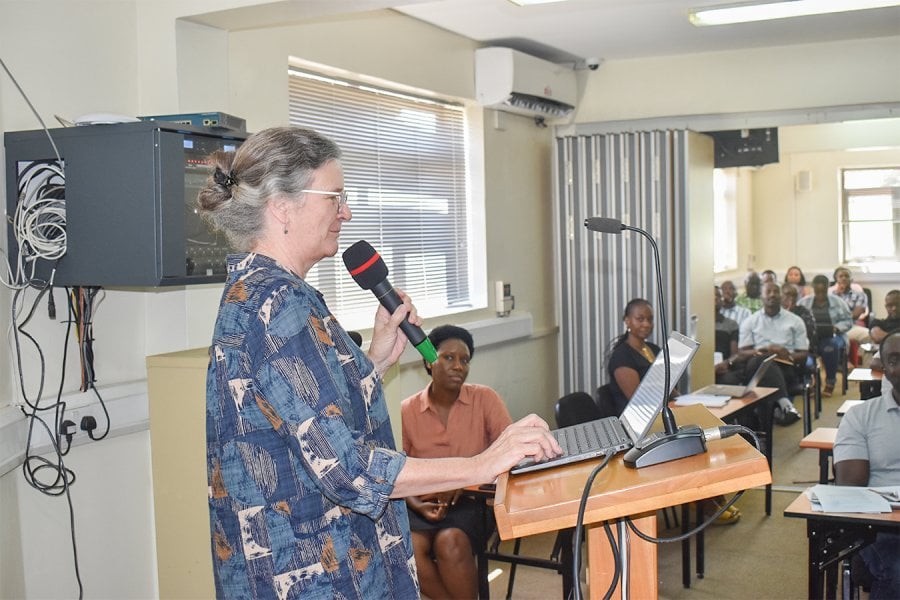
The Unit’s vaccine research theme successfully conducted a ‘Grants Day’, which brought together researchers from all research areas across the Unit’s three research stations to engage with experts in grant writing and increase their understanding of key related approaches, processes and strategies.
Participants benefited from expert insights from Professor Alison Elliott, Head of the vaccine research theme, whose presentation explored grant types, preparing for a grant and managing any setbacks therein. “Your proposal ought to be a sensible, relevant, and practical hypothesis that offers solid solutions to identified problems,” she emphasized.
Scientists also had a glimpse into the requirements of major grant review boards and what constitutes a compelling proposal from Deputy Director and Head of the Unit’s NCD theme, Professor Moffat Nyirenda, who has chaired and been a member of major scientific grant review panels on a global scale like Awards Assessment Panel for Africa Research Excellence (AREF.) His key message to ambitious writers was, “Keep everything simple and avoid coming off as overly ambitious.”
Experienced grant-winning scientists from the Unit, Dr. Gyaviira Nkurunungi, Dr. Moses Egesa and Asst. Professor Sheila Balinda shared lessons learnt and best practices from their successful grant-writing experiences. The trio underscored the importance of leveraging professional networks, having a robust CV with illustrated writing experience and being persistent at every stage of grant writing. "It is important to utilize available opportunities that are always shared internally" remarked Dr. Balinda, who recently won a 2-year grant to study the development of a vaccine against Crimean Congo haemorrhagic fever (CCHF) in humans and animals.
The highly interactive event was concluded with a vibrant ‘Dragon’s Den’-style primer grant award competition. Presided over by a panel of three judges that is, Moffat Nyirenda, Alexandra Anderson and David Mabe from the Unit and LSHTM, the competition saw 8 scientists pitch proposals for exciting high-impact studies spanning various fields of vaccine research, non-communicable diseases studies and viral pathogens surveillance in hopes of winning funding from a pool of £30,000.
Six successful studies emerged successful in the competition, and these are: “Assessing Community Acceptance and Willingness to Utilise locally Developed Vaccines" led by Edward Mwesigye. “Deciphering the role of baseline transcriptional profile in determining vaccine responses” by Bridgious Walusimbi, a scientist, and Gyaviira Nkurunungi, an Asst. Professor at the Unit. “HPV vaccine knowledge, perceptions, and uptake among non-school-going girls in rural Uganda” led by Jonathan Kintosa, a Scientist B under the Vaccines theme and “V4V vaccine discovery” with a focus on providing essential training for a multivalent Adenovector COVID-19 vaccine will be led by Fortunate Natwijuka, PhD Student and lab technician at the Unit. Studies like “Immune responses to Schistosoma mansoni in exposed but uninfected preschool-age children” led by Patrice Mawa, a mid-career Scientist at MRC/UVRI & LSHTM and EDCTP Postdoctoral Fellow and “Identifying subclinical TB” by Steve Cose, a seasoned cellular Immunologist at the Unit also emerged successful. The Grants Day proved to be a beacon of inspiration, offering a roadmap for successful grant writing.
ABOUT THE VACCINE RESEARCH THEME
Through key epidemiology and clinical trials, our team of vaccine researchers is working at all stages of the vaccine development pipeline to contribute to the development and implementation of relevant vaccines and context-specific techniques and measures for harnessing vaccine response and efficacy.
LSHTM's short courses provide opportunities to study specialised topics across a broad range of public and global health fields. From AMR to vaccines, travel medicine to clinical trials, and modelling to malaria, refresh your skills and join one of our short courses today.
